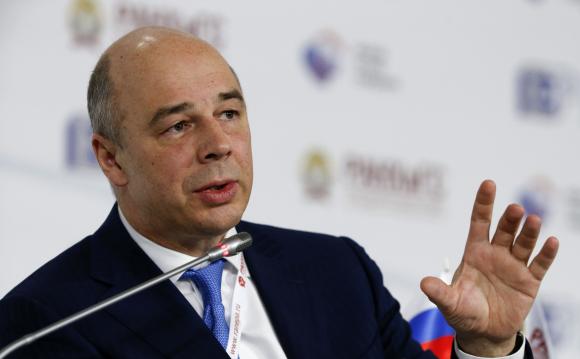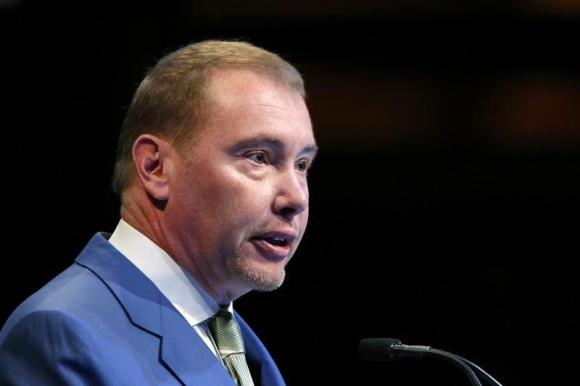www.aljazeerah.info
News, January 2015
Archives
Mission & Name
Conflict Terminology
Editorials
Gaza Holocaust
Gulf War
Isdood
Islam
News
News Photos
Opinion Editorials
US Foreign Policy (Dr. El-Najjar's Articles)
www.aljazeerah.info
|
Editorial Note: The following news reports are summaries from original sources. They may also include corrections of Arabic names and political terminology. Comments are in parentheses. |
Low Oil Prices Lead to Spending Cuts in Russia, May Lead to Collapse in US Capital Expenditures
January 14, 2015
 |
 |
|
Russia's Finance Minister Anton Siluanov attends the Gaidar Forum 2015 ''Russia and the World: New Dimensions'' in Moscow, January 14, 2015 |
Jeffrey Gundlach, chief executive and chief investment officer of DoubleLine Capital, speaks at the Sohn Investment Conference in New York, May 5, 2014 |
Russian finance minister warns on spending as crisis deepens
By Darya Korsunskaya
MOSCOW Wed Jan 14, 2015 7:50am EST
(Reuters) -
Russia's finance minister called on Wednesday for a cut in planned spending to weather an economic crisis, warning of a more than $45 billion drop in revenues this year if the average oil price is $50 a barrel.
In comments underlining the government's growing concern at the downturn, Finance Minister Anton Siluanov said all budget expenditure should be cut by 10 percent except defense, a priority for President Vladimir Putin.
Adding to the gloom, Economy Minister Alexei Ulyukayev said there was a "pretty high" chance Russia's credit rating would be downgraded to junk and a deputy, Alexei Vedev, said he expected inflation to peak at 15-17 percent in March/April.
A steep fall in the rouble, low prices for its main oil export and Western sanctions over Moscow's role in the Ukraine crisis have hit Russia's economy hard, and Siluanov said overall expenditure in 2015 must increase by 5 percent, not the 11.7 percent previously budgeted.
"The state cannot have the kind of spending it used to have with economic growth ... (and) with the oil price at $100 per barrel," Siluanov told a conference of state officials, economists and business chiefs.
But with Russia being starved of investment, pressure is mounting for stronger government action to pull it out of crisis.
"We need a radical turn in economic policy," said German Gref, the head of Russia's biggest bank, Sberbank, demanding a "breakthrough" to improve the dire investment climate, stymied by state pressure on business and weak rule of law.
Ulyukayev also highlighted the problems facing small and medium businesses, saying they must be supported to try to spur Russia's oil-dependent economy, which the World Bank expects to contract by 2.9 percent this year.
"The global economy will never again be what it used to be in 2000-07 and the situation in Russia will never be the same," Ulyukayev said, referring to the economic boom years under Putin when the global oil price soared. "It will be much more complicated. It already is much more."
BUDGET GAP
Russia's 2015 budget was based on an oil price of $100 a barrel but prices are now close to six-year lows at just above $46 a barrel.
"Regardless of having already curbed 2015 spending, we will ask parliament to cut by 10 percent all expenditure apart from defense spending," Siluanov added.
He said Russia needed to husband its reserves to overcome difficulties as the price of oil looked set to continue at low levels. The rouble, which fell about 40 percent against the dollar in 2014, has also continued its decline this year.
"We think that with the (average) oil price at $50 per barrel (in 2015) ... we will lose some 3 trillion rubles in revenues," he said.
Siluanov said the Reserve Fund, a rainy day fund of around $90 billion to cover budget holes, would be increased by 370 billion rubles ($5.60 billion) from last year's savings, but Russia would need to spend more than 500 billion rubles from it in 2015 to cover the budget gap.
The 500 billion, currently invested in foreign currency assets, would be converted gradually on the forex market.
Siluanov said the ministry could invest part of the Reserve Fund in rouble bank accounts to take advantage of the weak rouble and earn high interest.
"We need to have a lot more resources so as not to spend, not to burn up the reserve funds," he said.
($1 = 66.1200 rubles)
(Additional reporting by Polina Devitt, Gabriela Baczynska, Oksana Kobzeva, Jason Bush, Katya Golubkova and Elena Fabrichnaya, Writing by Elizabeth Piper, Editing by Timothy Heritage and Jon Boyle)
Oil fall could lead to capex collapse: DoubleLine's Gundlach
NEW YORK Tue Jan 13, 2015 6:29pm EST
(Reuters) -
DoubleLine Capital's Jeffrey Gundlach said on Tuesday there is a possibility of a "true collapse" in U.S. capital expenditures and hiring if the price of oil stays at its current level.
Gundlach, who correctly predicted government bond yields would plunge in 2014, said on his annual outlook webcast that 35 percent of Standard & Poor's capital expenditures comes from the energy sector and if oil remains around the $45-plus level or drops further, growth in capital expenditures could likely "fall to zero."
Gundlach, the co-founder of Los Angeles-based DoubleLine, which oversees $64 billion in assets, noted that "all of the job growth in the (economic) recovery can be attributed to the shale renaissance." He added that if low oil prices remain, the U.S. could see a wave of bankruptcies from some leveraged energy companies.
Brent crude LCOc1 approached a near six-year low on Tuesday as the United Arab Emirates defended OPEC's decision not to cut output and traders wondered when a six-month price rout might end.
Brent has fallen as low as just above $45 a barrel, near a six-year low, having averaged $110 between 2011 and 2013.
Gundlach said oil prices have to stop going down so "don't be bottom-fishing in oil" stocks and bonds. "There is no hurry here."
Energy bonds, for example, have been beaten up and appear attractive on a risk-reward basis, but investors need to hedge them by purchasing "a lot, lot of long-term Treasuries. I'm in no hurry to do it."
High-yield junk bonds have also been under severe selling pressure. Gundlach said his firm bought some junk in November but warned that investors need to "go slow" and pointed out "we are still underweight."
Gundlach said U.S. stocks could outperform other countries' equities as the economic recovery looks stronger than its counterparts, though double-digit gains cannot be repeated.
He also reiterated that it's possible yields on the benchmark 10-year Treasury note could drop to 1 percent in 2015. The 10-year yield traded around 1.91 percent on Tuesday, little changed from late on Monday after hitting 20-month low of 1.8640 percent.
"The 10-year Treasury could join the Europeans and go to 1 percent. Why not?" Gundlach told Reuters last month. "If oil goes to $40, then the 10-year could be going to 1 percent."
The yield on 10-year German Bunds stood at 0.47 percent on Tuesday.
(Reporting by Jennifer Ablan; Editing by James Dalgleish and Alan Crosby)
***
Share this article with your facebook friendsFair Use Notice
This site contains copyrighted material the
use of which has not always been specifically authorized by the copyright
owner. We are making such material available in our efforts to advance
understanding of environmental, political, human rights, economic,
democracy, scientific, and social justice issues, etc. We believe this
constitutes a 'fair use' of any such copyrighted material as provided for
in section 107 of the US Copyright Law. In accordance with Title 17 U.S.C.
Section 107, the material on this site is
distributed without profit to those
who have expressed a prior interest in receiving the included information
for research and educational purposes. For more information go to: http://www.law.cornell.edu/uscode/17/107.shtml.
If you wish to use copyrighted material from this site for purposes of
your own that go beyond 'fair use', you must obtain permission from the
copyright owner.
|
|
|
|
||
|
||||||


